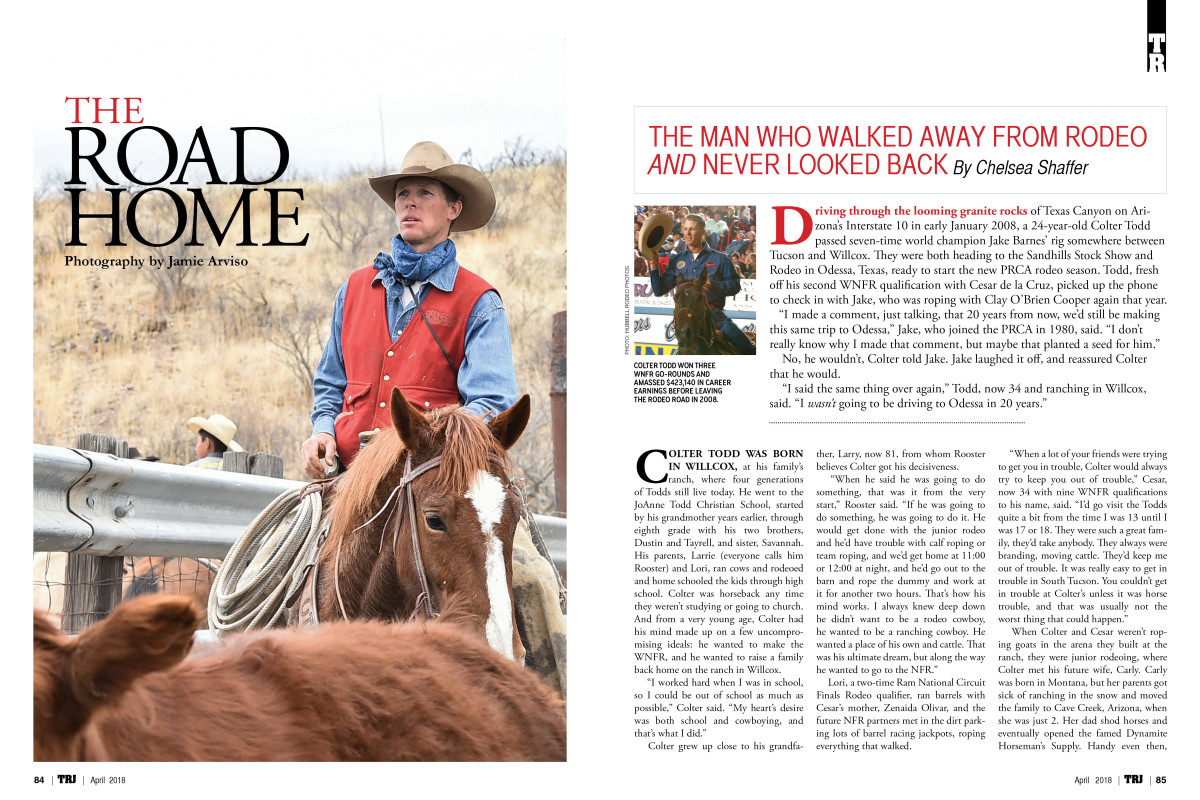We just sent the April issue of The Team Roping Journal off to press, and I got to work on a story that might just be one of my favorites of all time. (I think this whole April issue is my favorite of all time, by the way.) Not because of my work itself by any means, but because of the guy I learned about while I put the story together.

Here’s some background:
I started working on the Spin To Win Rodeo team in 2011. That was a full three years after Colter Todd retired, and I would occasionally come across his name in results or old issues of the magazine as I transitioned old stories to the website. I was just a barrel racer then (still am, to be really honest) and didn’t grow up watching tapes of the BFI or the Strait (though those DVDs now play at our house regularly). As I got to know guys like Derrick Begay and Cesar de la Cruz, I’d hear Colter’s name mentioned in passing. Once, when Derrick dropped his grey mare Bowkay off at my house for a week during the Fourth of July, he mentioned that she came from Colter.
Editorially, I knew Colter’s bio. He’s Will Woodfin’s brother-in-law, who Cesar made his first three WNFRs with. He roped great, and now he ranched. That was about all I knew.
But as partner swaps began to happen this year, and rumors of top ropers quitting (none of those rumors were true) I heard an adverb thrown around in casual conversation: “Is he quitting, or is he ‘Colter Todd’ quitting?” guys would say.
In rodeo, ‘quitting’ usually means a guy is going off the road until he finds bigger bank account, better horses, a better partner, or a better attitude. Guys will usually jackpot around the house, head to the amateur rodeos, and show up at the big open ropings as second partners.
But ‘Colter Todd’ quitting has a very different meaning. That means a guy is really, really quitting. Finished. No entering the winter rodeos and seeing how it goes, no cracking out at the Cinch Timed Event Championship once a year. It means a roper is walking away and never looking back.
Colter hadn’t entered a roping that took a TRIAD number since the spring of 2009, just months after he went off the road for good. When I called him out of the blue, he was headed to town to pick up a Ranger that needed some repairs after a lot of hard use on his Willcox ranch.
It had been a while since I’d called a complete stranger and told them I wanted to write their life story. Colter laughed when I told him he’d become a larger-than-life legend, and couldn’t quite believe his name had become an adverb to describe the kind of quitting he did in rodeo.
This story took quite a few calls to Colter, and I’m lucky Derrick and Cesar vouched for me (I think?) that I wasn’t a complete crazy person calling this guy out of the blue. When you get the magazine in the mail in a few weeks, you’ll see that it’s long piece, full of warm photography by Jamie Arviso (Derrick’s sister, who is as handy with a camera as her brother is with a rope). But even as long as that story is, there are tiny details and anecdotes that didn’t fit in those six pages. Here’s one, where Colter described to me his first memory of Derrick.
We were at this place in the Northwest, and this guy we were staying with had him a flatbed load of hay—two wire. It was just sitting there, so I started unloading it. Derrick came walking up, and he leaned there for a while. I started visiting with him about life. I didn’t want to ask him to unload hay. It was better than doing it by myself quietly, so I just kept unloading it while we talked. He asked me if I was going to unload the whole thing, and I said, ‘Maybe, I’m just going to get started at least.’ And then he sat there a little while longer, and pretty soon he was unloading hay. You can’t tell if he wanted to help or not. From the start, Derrick intrigued me. If you didn’t want a real answer, you didn’t want to ask Derrick. He wasn’t going to sugar coat anything.
And then, in one of our later phone calls, Colter admitted that thinking about rodeo, for the first time in a long time, had got him really reminiscing.
Memory lane has been crashing over me since we talked. There were so many really good people. People who helped me to get there. The Petskas, his family, Jake Barnes. Tee Woolman. What they’ve done and said to me. Whether it led me to this or even success. That’s really special. I made a lot of really neat friends, and that’s what I can take from all of it. Cesar was the best man in my wedding, and I was the best man in his. We were great friends, all through it.
There’s about 4,500 more words to this story, and I hope you enjoy reading them when the magazine shows up at your door. If you don’t have a subscription, you can download digital copies through our App Store.







